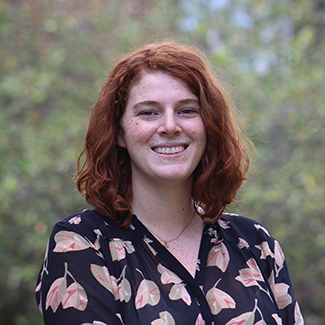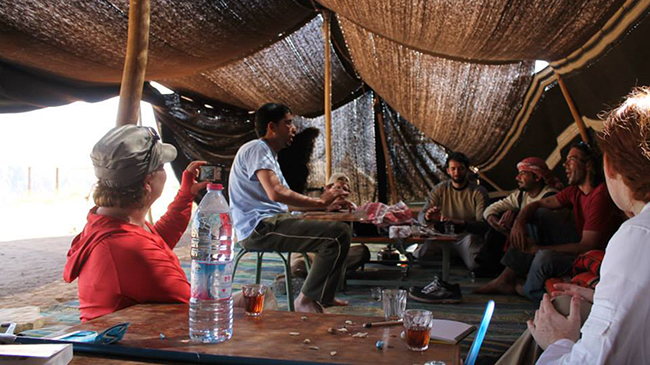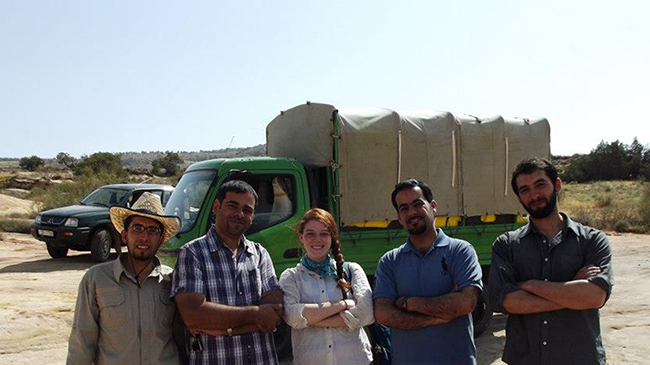
Laura Duncan ’13
B.A. in International Studies
Biography
Laura Duncan of Louisville, Ky. graduated from IU Southeast in 2013 with a B.A. in International Studies. As an undergraduate, she took advantage of the opportunity to study abroad in the middle-eastern kingdom of Jordan, joining an IU Southeast class engaged in field biology research in the famed Dana Biosphere Reserve, a hotspot of biological and cultural diversity featuring natural wonders and important historical sites. After graduation, she spent time interning at the Burkle Center for International Relations at UCLA in Los Angeles, Calif., before taking a position with the Beaded Treasures Project in Louisville, Ky., a nonprofit helping refugee women generate sustainable livelihoods from jewelry. Laura Duncan shared her study abroad experiences with Academic Information Officer Steven Krolak.
Was your study abroad tied to a course?
I was looking for a study abroad experience that involved animals. Dr. Jean Abshire recommended me to Dr. Omar Attum, who was leading the biology field course in Jordan. In this course, we studied the impact and use of man-made watering holes by carnivores in the Dana Biosphere Reserve. The class involved tracking animals, collecting data and images from camera traps, and making sense of the information collected. Some of the animals we identified were caracals, hyenas and wolves.
What did your average day look like?
When we were doing our research at the Dana Biosphere Reserve, a desert nature reserve, we stayed in tents. We woke up at dawn, walked to the solar powered showers, ate a communal breakfast and strapped on our hiking boots to hit the trails.
What sounds do you remember?
When we were in Amman, the capital city, I remember how in one moment you knew that you were surrounded with one million other people, but when the call to prayer would ring out from the loudspeakers, everything would take a long respectful pause. And there was silence except for the call of the muezzin.
How did you manage with the language?
Our professor, Dr. Attum spoke Arabic, and we always had some translators with us. In the city, many people spoke English. But I also practiced basic phrases constantly. Thabit, one of the park rangers, spent a lot of time trying to teach me the Arabic alphabet and speak basic phrases. We were given booklets to record different species that we came across, but my booklet was mostly Arabic practice!
What was your favorite hangout?
We loved hanging out in the Bedouin tent at the Rummana Camp, where we stayed during our research. The Bedouin tent was exactly like you picture from movies like Lawrence of Arabia—we relaxed on some floor cushions, shared tea, and played games.

Laura Duncan (r) relaxes with colleagues in a Bedouin tent in the Jordanian desert.
Were there challenges?
Yes, I was challenged by my preconceived perceptions of the Middle East. One of the biggest shockers for me was how similar life is. I bought a conservative swimsuit just for the trip, but when we were on the beach there were people wearing thongs and speedos next to women in full burqas! It was so much more diverse than I thought. But I was very upset when I saw the condition of the “women’s pools” versus the “men’s pools” at the hot springs. It really hit home–the wide cultural gap between men and women in many parts of the world. Some of the people we met were very conservative. It was shocking when some men, whom we had spoken with for more than a week, would not shake my hand because I was female.
What was the most magical thing that happened?
Walking the same roads that ancient Romans built was pretty magical. We visited Malik, the uncle of one of the rangers, who had an olive tree that was more than 2,000 years old. I could only imagine the thousands upon thousands of people who took shelter in its shade like we were doing.
What were some of the ways that study abroad advanced your learning?
Studying abroad forces you to leave your comfort zone and to think on different levels. I feel that is was less a matter of me advancing academically, but more of an advance in being able to view my problems through larger lenses and to be more creative in my approaches to answering questions.

Laura Duncan (c) with park rangers from the Dana Biosphere Reserve.
How did study abroad change you?
While I had worked abroad before studying abroad, this was my first experience in the Middle East. My preconceived notions of what the Middle East is about were false. I realized quickly that I have to come with an open mind (even if I think that my mind is open already).
What do you think was the biggest benefit of study abroad?
Experience in a strange environment. If you can work effectively in an unfamiliar place, then that will say a lot to your potential future employers. When I hear people thinking about studying abroad, I always try suggesting that they go somewhere that they never would have imagined themselves.
Where will you go next?
Next on the list are India and Peru!
For information on Study Abroad opportunities at IU Southeast and through the IU system, please visit the Study Abroad website or contact Dr. Jean Abshire, director of international programs at jeabshir@ius.edu or 812-941-2514, or Dr. Valerie Scott, co-director of international programs at vbscott@ius.edu or 812-941-2502.
Homepage photo: Laura Duncan cools off at a waterfall in the Dana Biosphere Reserve in Jordan. Photo courtesy of Laura Duncan.


